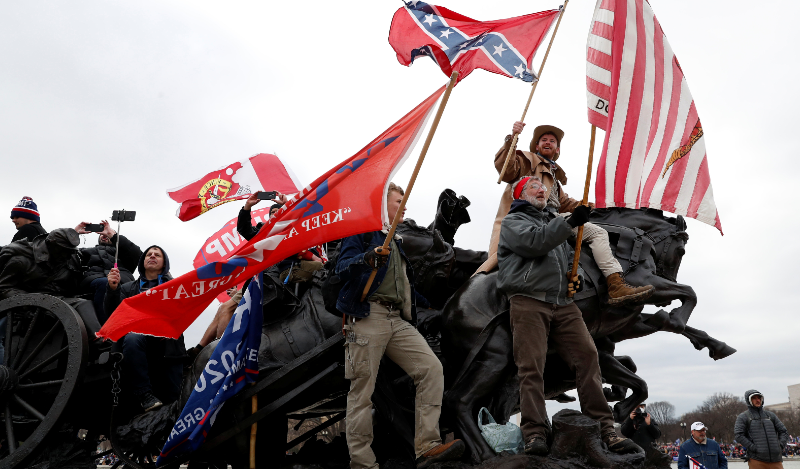Commentary March 26, 2021
Support for Political Violence Among Americans is on the Rise. It’s a Grim Warning About America’s Political Future.

Business Insider
In February, the Survey Center on American Life, released a new poll that revealed some disturbing findings: Under certain circumstances, a significant number of Americans appeared to endorse the use of political violence.
Nearly one in three Americans said that taking “violent actions” is an appropriate remedy when elected leaders refuse to protect the country. An even larger share of the public — 36 percent — agreed that the “use of force” is necessary to arrest the decline of America’s traditional way of life. But how alarmed should we be about the rise of public support for political violence in the US? If my initial reaction was one of concern, further research has only compounded my fears.
People who support political violence are not simply mad about the 2020 election
Our poll revealed a surprising amount of public support for political violence, but there was also a notable lack of intensity. In measuring attitudes about political violence, we offered respondents the opportunity to “completely agree” or to “somewhat agree” with each statement. What does it mean to “somewhat agree” that violence can be justified to protect the country?
One conclusion we can draw is that the number of Americans who feel enthusiastic about using force to resolve political differences is much smaller than the initial findings suggest. As we noted in the report, “only 9 percent of Americans overall and only 13 percent of Republicans say they completely agree in the necessity of taking violent actions if political leaders fail.” Still, that nearly one in 10 Americans enthusiastically back a politics based on brute force is not terribly encouraging.
What’s more, support for political violence did not arise simply in response to this one election outcome. Given that we conducted the poll a few short weeks after the attack on the Capitol, it is possible that we took America’s temperature at a time when it was at an elevated state. But there are a couple of reasons this is unlikely.
First, there was little evidence of widespread voter outrage, even among the election losers. Only 3 percent of Americans and 8 percent of Trump voters say they felt angry that Biden would be president. Second, our findings are consistent with a study conducted by Larry Bartels in 2020 before public passions had become inflamed with false claims of a stolen election. In fact, we replicated one of Bartels’ questions and produced nearly identical results.
Justifying the use of force in their own words
Support for political violence does not appear to be an artifact of question wording or framing either. To better understand how people understood the issue we re-contacted a random subset of respondents who affirmed the use of force in politics to have them discuss the issue on their own terms, and in their own words.
Even when posed in an open-ended format, most respondents still endorsed the use of political violence and could readily reach for a justification. A 63-year-old male respondent suggested that he would condone the use of violence “when the political representation in their country fails to represent them or violates the founding principles of their Constitution.”
A 69-year-old female respondent couched her support in terms of religious liberty: “It’s not just political beliefs, but when they are also violent against our freedom of religion, just by verbally attacking, the people have the right to defend themselves.”
Another respondent said violence can be justified when “our American way of life is taken away.”
In nearly every instance, political violence was supported as a defensive position, an action of last resort needed to resist an imperious government. Although these responses are not representative of the entire group of people who endorsed the use of violence in the poll, they demonstrate that people have little difficulty articulating a justification for political violence and do so using similar language.
Growing partisan hostility
Support for political violence is almost certainly the product of the broader political context and cues from political elites. Past research suggests that concerns about demographic change, strong partisan identity and feelings of partisan hostility are linked to support for political violence.
In our poll, support for political violence is much higher among those who believe white people experience discrimination comparable to Black people and other minority groups. Moreover, people may be more prone to engaging in extra-constitutional actions if they believe democratic processes are corrupt or stacked against them and that their political opponents present an existential threat.
Our research finds a bipartisan majority of the public agreed that American democracy only serves the interests of the wealthy and powerful, and shows widespread agreement among Republicans that the political system is stacked against conservatives and people with traditional values. Partisan antipathy is also at a high-water mark — Republicans and Democrats are far more likely to say their political opponents pose a threat to the country today than they did just a few years earlier.
At this point, it is not a foregone conclusion that violence will become a regular feature of national elections. Research that looks at the prevalence of politically-inspired physical violence finds that it is still quite rare. Findings from the Cooperative Congressional Election Study show that only 1.5 percent of Americans have engaged in political violence, although the authors note that physical altercations increase to 9 percent among those who say political violence can be justified. But the January 6 attack may have marked a turning point. A new CNN poll finds that 71% of the public now believe political violence is at least somewhat likely following elections.
In the wake of the Capitol uprising, we have been forced to reckon with the uncomfortable truth that political violence is no longer a theoretical concern. If political leaders weaponize concerns about demographic change and undermine trust in democratic institutions, some members of the public may seek to achieve their political goals through non-democratic means including the use of force.
If provided a compelling reason by political elites many Americans — certainly a much larger share than the group of Trump supporters who invaded the Capitol building — will consider violence to be a reasonable political recourse.








